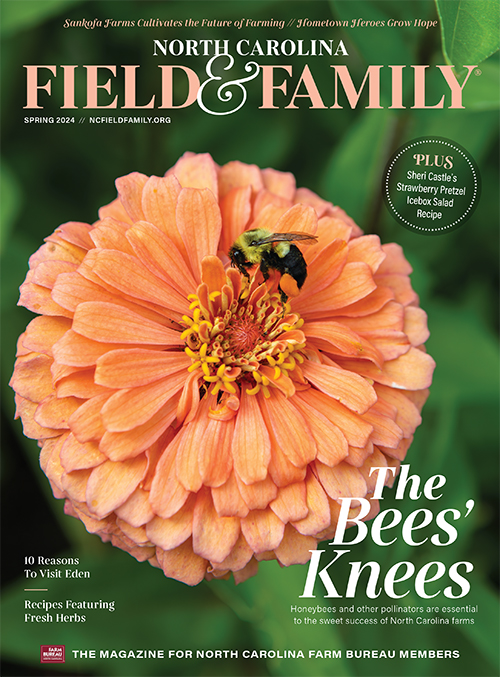The Different Dialects in North Carolina
Would you know how to respond if someone called you a dingbatter? Or asked you to play a game of meehonkey? How about if someone told you to stop mommucking them?
Farm Bureau |Would you know how to respond if someone called you a dingbatter? Or asked you to play a game of meehonkey? How about if someone told you to stop mommucking them?
If you lived in the Pamlico Sound area of Eastern North Carolina, you would.
Read More: Deciphering North Carolina’s Dialects
Though English is the predominant language of North Carolina, each geographic region has a unique dialect that retains and reflects the influence of the area’s settlers.
The Pamlico Sound region has one of the most distinct dialects in the state, according to Erik Thomas, associate professor of linguistics at N.C. State University.
Settlers of the Pamlico Sound region came from either Southeastern or Southwestern England, and many migrated from the Chesapeake Bay area of Virginia. Until the 1950s, Eastern North Carolina was isolated from the rest of the state. Large swamps made passage difficult and the few roads that ran to the towns were impassable half the year.
The geographic isolation prevented any other dialects from influencing the British English, Thomas said.
“The only way you could get in or out was by boat, so most of the population didn’t go anywhere,” Thomas says. “The accent sounds a little more exaggerated, a little more Cockney.”
Natives to the region use words such as “pizer” for porch, “screech owl” for shivering owl and “mommuck,” which has a variety of meanings that include annoy or beat someone up. The word “meehonkey” is often used to mean a game of hide and seek, he said.
Walt Wolfram, William C. Friday distinguished professor of English at N.C. State, calls it “one of the few distinct dialects in the United States.”
Wolfram, who directs the North Carolina Language and Life Project, says natives of Ocracoke sometimes convey descriptors in opposite terms. For example, they will say “it’s a right nice day out” to mean “it’s raining really hard.”
Wolfram attributes the dialect’s origins to the area’s founders as well as its geography. “Words like ‘dingbatter’ (outsider) developed in part because of their unique environment to the outside world,” he says. “Their situation is unique—island people versus people who are off,” (someplace other than the island). There is no dialect like it.”
Farther inland, the Lumbee Indians of Robeson County are another group that has retained the influence of English settlers.
Wolfram said the Lumbees have embraced the English dialect in absence of their ancestral language, and formed a hybrid dialect that is distinct to Lumbee Indians living in that region.
Common words include “youngins” for children and frequent use of the word “baby” as a term of endearment. Also, the “ere” sound is often pronounced “ar.”
Wolfram says he ran a study that found that Robeson County natives can determine a person’s ethnicity by hearing only their voice.
“People from inside Robeson County can identify speakers as black, Indian or white,” he says.
Even in the Piedmont region of North Carolina, where metropolitan centers like Charlotte and Raleigh are located, there are still areas where the dialects are strong, though they have been watered down by the massive influx of residents in the past 50 years.
The sound of the Piedmont dialect is more similar to classic Southern speech, Thomas said. For example, the long “i” sounds in the words “time” and “five” are drawn out to something that sounds like “ah,” and the “r” after vowels is unpronounced—“Chalotte” instead of “Charlotte.”
“The old-fashioned Piedmont is similar to accents you hear in Atlanta and over a good stretch of the South,” Thomas says.
Currently, the region is experiencing what is known as dialect leveling, he says. Local traditional dialects are disappearing because many non-Southerners are moving to the area.
“So many older Southern features are disappearing, so you don’t get the long ‘i’ among the younger speakers of the area anymore,” Wolfram says. “You get a speech that is typical in a widespread area.”
Still, older residents more frequently use terms such as “mash” instead of “push,” and phrases such as “cut off the lights” to mean “turn off the lights.”
“You can see some fairly dramatic changes in older and younger speakers,” he said.
Similar to Eastern North Carolina, Western North Carolina has a unique accent that is heavily influenced by its Scotch-Irish settlers. Some of their unique terms include whistle pig (groundhog), lay out of school (play hooky), poke (bag) and heidi (hello).
Thomas says the state used to be split in half by the pronunciation of the word for the sound a horse makes, Thomas said. In the eastern part of North Carolina, a horse “wickered” and in the western part, a horse would “nicker.”
Another characteristic of the Western North Carolina accent is that westerners draw out vowel sounds in almost all words, whereas easterners only exaggerate the sound in certain words.
“The ‘i’ being (drawn out) was considered a working-class feature, and people who were socially aspiring wouldn’t say it,” Wolfram says.
The next time someone tells you “it’s right nice out” when it’s raining, or they are headed to “Chalotte” or they spotted a whistle pig in their garden, you’ll know exactly what part of North Carolina they call home.



…Content excellent! Thank you for your wise words.
Well, the reason I even read this was, I was searching for the origins of the Lumbee accent. It has often occured to me that the Lumbee accent is rather similar to a British accent. For example, “pocket knife” is “pawket noif”. I say British, but Cockney may be a better description. I am in Cumberland County N.C. and the Lumbees around here are all but isolated, yet they retain this thick accent for some reason. My ancestry goes back pretty far with everyone being pretty much from this same area and even farthur back to Scotch/Irish origins, yet none of my folks or any other folks I know speak with an accent anywhere close to that of my Lumbee friends. Even among Native Americans, a great number of which are from, or have there origins right here in N.C., do not. Anyway, would you say its British or Cockney? I had been saying British, even in favor of Scotch/Irish. This puzzled me because I thought…could this really be remnants of British occupation? Or are you more in favor of it being English influence or possibly even Scotch/Irish.? Thank you for your time.
Would someone pronounce North Carolina as North Carol lena
xD LOL
that would be kinda funny
Oh. If at all possible, please make your response to myspace.com/dsmbodyd Thanks!
In response to Anthony Beasley. I am Lumbee and reside in the Robeson County area of North Carolina. Most Lumbees if they are close to their family, relatives, or homeland do indeed speak with the distinct accent that you spoke of. I know that in my area, most consider it to be Scotch/Irish some, since some Lumbee Indians can trace parts of their ancestry back to the Scotch/Irish decent.
The term, “Scotch” in “Scotch-Irish” is inaccurate. Use of the terms, Scots or Scottish is correct.
The Scits-Irish did not include those from Scotland. Rather, the term was created to differentiate between the earlier protestant Irish and the later Catholic Irish.
Socioeconomics plays heavily into the current accent of Westers NC. Those aspiring out of the WNC stereotypes have trained themselves to speak with a more neutral northern accent. They make it rather clear that they do not want to be associated with the ignorance and inbreeding of the Western NC mountains.
I have often heard supermarket carts referred to as buggies. And when these people cock their heads to the side and say, “Do what?”, they are asking you to repeat what you just said because they didn’t hear or understand.
Scotch-Irish is actually the traditional term, dating back to Elizabethan times, and very much correct. If you want to be called Scots-Irish, that’s fine, and many younger people are using that term. But please don’t correct those of us who are older Scotch-Irish descendants who have been called that all of our lives. Here’s one of many articles on the subject:
http://www.ulsterscotslanguage.com/en/texts/scotch-irish/scotch-irish-or-scots-irish/
“It’s right nice out” is completely a true thing we say. I’m from Washington in Beaufort (bo-fert) County. We also say “wooder” instead of “water” but usually only when we’re talking about drinking water not like the river water.
would someone pronounce nintendo nentendie
nice
why do people talk like dis
There was a shift in vowel sounds a few hundred years ago that residents of the Outer Banks seem to have missed. For example,missing from this article is what the “long i” in the Bankser’s accent sounds like. If you’ve ever been to Hawaii you’ve tasted the gray mush they call “poi.” That vowel sound is how a long “i” is pronounced on Core Sound and along the outer banks. Thus, “pizer” is pronounced “poi(or poy) zer,” and high tide is “hoi (or hoy) toide (or toyd).” Another archaic vowel sound is the “ou” sound, which is pronounced like a long “a” in standard American English. On the Core Sound (inside Core Banks and Cape Lookout), “high tide on the sound side” is pronounced “hoi toid on the sane soide.”
When we moved to the NC mountains we were surprised to hear some people say “youns” instead of ya’ll.
Thanks for sharing your research
Scrap Copper industry
great website dude! online casinos usa
Text Inmate
https://www.contactmeasap.com/
Incognito Market’s User Interface: A Design Perspectiv
Navigating the Shadows: Security Protocols on Incognito Market
Incognito Darknet Market: The Challenges of Policing Online Underworlds
Incognito is a dark market that operates on the Darknet, an encrypted network accessible only through specialized software such as TOR. This anonymity allows users to trade a variety of illegal goods and services.
https://incognitomarkets.org
where to buy lisinopril 10 mg
Why settle for an ordinary breakfast when you can have pancakes delivered in Munich from Mr. Pancake? Order now and start your day on a delicious note. wolt Pancakes
Latest US news, world news, sports, business, opinion, analysis and reviews from the Guardian, the world’s leading liberal voice.
https://www.guardiannewstoday.com
http://vrn.best-city.ru/forum/thread540107043/#reply540107359
Dr Oetker American Pancakes Origineel – Delicious Fluffy Pancakes Recipe
Let’s flip the script with these scrumptious American pancake recipes—stacks on stacks of goodness guaranteed to make your taste buds dance!
So, students need to be careful with this service and make sure they aren’t putting their academic integrity at risk. Students should also think carefully about how much the service costs and make sure it fits with their budget and academic goals. online assignment help services can be convenient and helpful for students who are struggling with their coursework, but students need to recognise that these services are not a substitute for learning. Students who rely too heavily on these services may be missing out on valuable learning opportunities and may struggle when it comes time to complete exams or other assessments.
stromectol 3mg Can patients request a review of potential side effects for medicines used in the treatment of autoimmune diseases.
How can I adjust the audio settings of my Samsung Q60B 55 inch TV and soundbar to balance the background music and dialogues in movies? I have tried different sound modes and presets, but none of them seem to work well. Is there a way to manually tweak the equalizer or the dynamic range compression?
https://technsight.com/
]